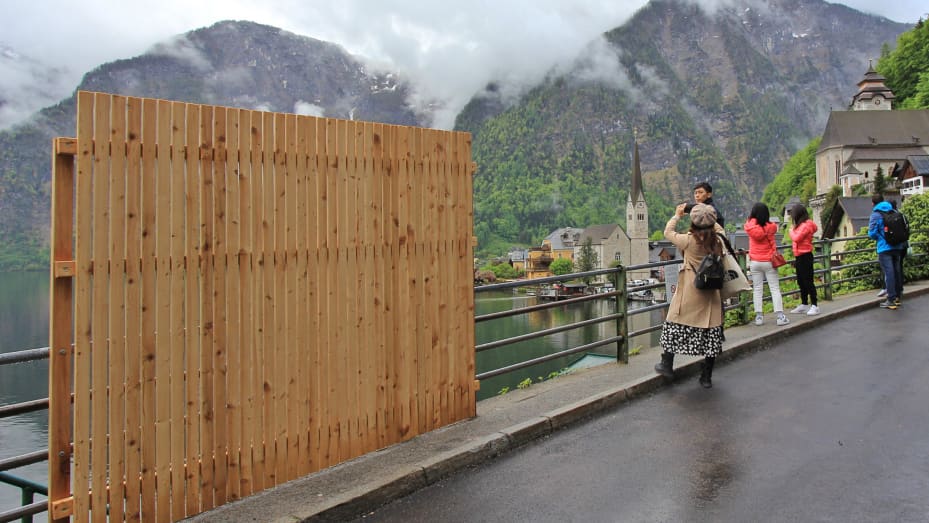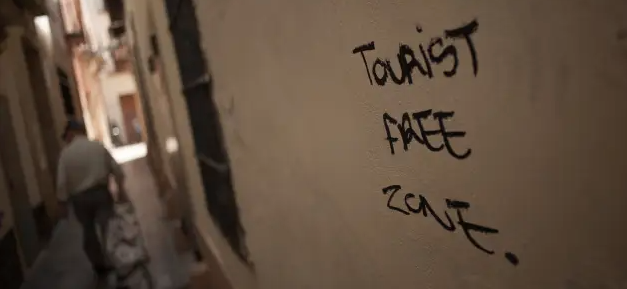||| FROM CNBC ||| REPOST AT REQUEST OF ORCASONIAN READER
From overtourism to no tourism — and back again.
Many cities have come full circle to worrying about too many tourists rather than too few.
The rise of budget airlines, short-term home rentals and cruise ships are part of the problem, said Lionel Saul, a research assistant and visiting lecturer at EHL Hospitality Business School.
But social media, online influencers, movies and television shows are too, since they drive many people to the same places, said Tatyana Tsukanova, a research associate at the same school in Lausanne, Switzerland.
“They just come, take a nice selfie, publish them on social media, increase the popularity of this place … and leave,” she said.
The pool of travelers is growing. The United Nations estimates the world population will reach 8.5 billion in 2030. And an additional 50 million international tourist arrivals are expected per year — mostly from Asia — between now and 2030, according to the U.N.’s World Tourism Organization.
What’s being done?
Residents of the tiny Austrian village of Hallstatt — rumored to be the inspiration for Disney’s blockbuster “Frozen” franchise — built a wall at a popular lookout point after tourism hit fever pitch following the town’s appearance in a South Korean television series, said Tsukanova.
“They faced maybe around 1 million tourists a year for … 800 residents,” she said.
But the wall didn’t last long. After online backlash, village officials took it down, said Tsukanova.

Signs urged visitors to stay “Quiet Please!” and a driving barrier was installed at Hallstatt’s entrance before the Austrian town built a fence at a popular lookout point. Reinhard Hormandinger | Afp | Getty Images
**If you are reading theOrcasonian for free, thank your fellow islanders. If you would like to support theOrcasonian CLICK HERE to set your modestly-priced, voluntary subscription. Otherwise, no worries; we’re happy to share with you.**









Thanks for posting Lin. Considering that SJC is on the verge of approving a new tourism management plan that will guide the future of tourism in the San Juans, and is one by design that will bring even more tourists to SJC every year, it’s important for us to keep this issue on the forefront of our minds at the present time.
While acknowledging that tourism is, by nature, an extractive industry, and that economic restrictions are only half-measures, (adding that fines and fees alone will not prevent over-tourism), in reading this article we are reminded that there are many other places in the world that are experiencing the same problems that we are in relation to over-growth and over-tourism. As such, I always find it interesting to hear the litany of policies that other places have employed in their efforts to deal with the known problems that are related to over-tourism.
The CNBC article, also accompanied by Guardian’s Over-tourism in Europe’s historic cities sparks backlash, and EHL Insights– Hospitality trends: Unveiling the harsh reality of over-tourism, provides insight into the variety of measures that have been employed in resort communities throughout the world that are designed to prevent over-tourism, including the re-writing of out-dated zoning ordinances, the outright ban of vacation rentals in some neighborhoods, limits on daily visitors, restricting cruise ships, restricting the number of tourists shops, caps & limits on lodging (incl. hotels and vacation rentals), dispersion to lesser-trafficked areas, limits restricting the numbers of people that can stay in short term vacation rentals and limits on the length of time of annual operation, banning tour groups in some areas and requiring permits for tours to operate in others, the creation of tourist taxes, increasing the cost of tour buses, and increasing fines for bad behaviour.
For some communities, reading about these, as well as many other policies that have been crafted to curtail over-tourism, is old news, with many of these policies having been implemented in some communities years ago.
Hitting closer to home, I was encouraged to hear a report on CBC today announcing the new short term vacation rental policies that have been implemented in cities in B.C. with populations of 10,000 or more. The report highlighted the following major revisions to B.C.’s current short term vacation rental policies–
1) increased data sharing between rental platforms (Airbnb, VRBO), and the host cities, (including the requirement that vacation rental owners business license numbers must be listed on all platform listings, and the requirement that the rental platforms must provide the names and addresses to the local government of the vacation rental owners that are being listed on the platform,
2) a $3,000 p/day fine for non-compliant or illegal vacation rental operators, and up to $10,000 in fines for the platforms that host illegal or non-compliant vacation rental listings,
3) in order to legally rent a short term vacation rental the vacation rental owner must live full-time in the primary residence on the property,
4) and the addition of a new short term vacation rental enforcement and compliance team.
The question often arising at moments like this, is, how are we going to pay for enacting and enforcing such policies? This is, I believe, asking the wrong question. The real question that we should be asking ourselves is, what are the long-term negative consequences to our communities if we don’t?
Afterall, tourism is one of the largest, and one of most extractive industries that there is in the world today, and outdated government policies that do not protect communities from over-growth and over-tourism are essentially promoting the sale of something that does not belong to them: the quality of life of the people who live there.
“The San Juans are not for sale.”
Agree with Michael Johnson’s comment, and on the measures B.C cities are taking to slow the VR industry because they are the very worst offenders and contributors of the problem we face. SJC would do well to adopt and enforce these same 4 policies on VR rentals. Air B n’ B seems to be the biggest advertiser on youtube and other platforms; their ads are ubiquitous and obnoxious. They are the PIMPS. The fines here on out-of-compliance air b ‘n’ b’s and VRBOs – do they even exist? Are they cumulative, or larger fines for each offense? Do we have enough enforcement to even do anything about the problem? Again, why is Orcas so far above any of the other places, in numbers of these VRBOs, especially in Eastsound UGA? Answer please, commissioners. I’m still waiting. If fines are one time or too lenient (if they even exist at all) they have no real effect to stop repeat violators, since profits on these things are astronomical. I like the idea of daily cumulative fines and staff to enforce them. Money talks – hitting them in their obscene profits is the only thing that is going to slow down the outright abuses on these islands – Orcas in particular.
TO REITERATE: I don’t blame the tourists; it’ not their fault! We understand that we are a tourist destination. We like the fresh reminders of the beauty and positive points of this place. The pimps, however should be fined heavily or even shut down. The whole industry, from real estate to the Chamber of Commerce and tourism industry, is responsible for over-tourism. They sell ‘paradise’ and contribute to the land grab and astronomical steep rise of real estate values. They need reeducation and to participate in the solution, not further cause problems.
We are not a theme park. These lands and waters were and are sacred to those who lived here before the Settlers. We are the settlers – and they were pushed off of their sacred lands. Can we learn from the mistakes and misdeeds of our ancestors and be different? On a global level it’s looking grim. But locally, we might have a chance to be good neighbors and hosts- and not let the few greedsters ruin it all. Worth contemplating!